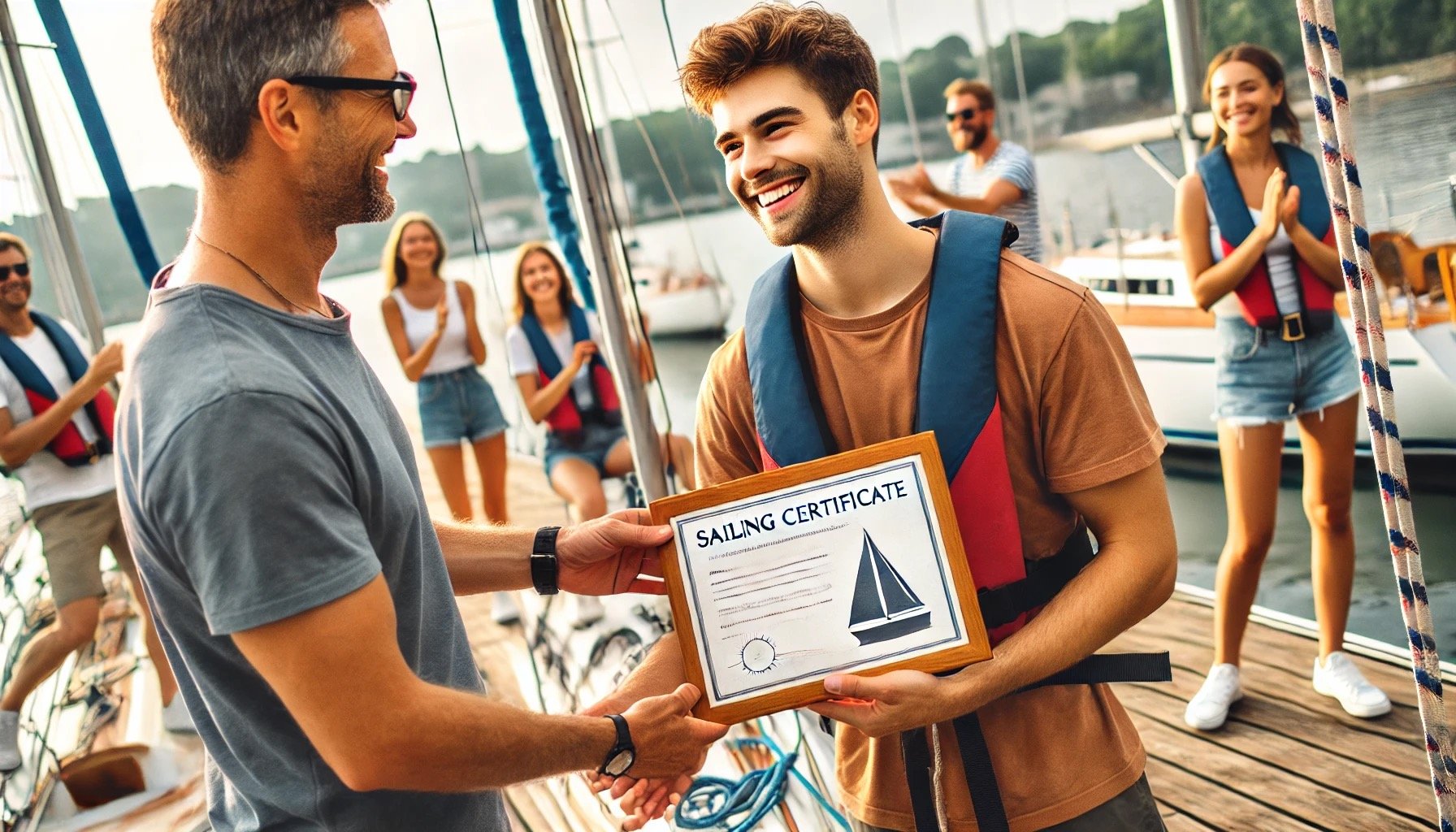Choosing the Right Sailing School: A Guide for Aspiring Sailors
Navigating the world of sailing schools can feel as overwhelming as riding the waves in a storm. The right school will set your course straight, whether you’re dreaming of mastering the art of the tack or simply looking to impress your yacht club pals.
Your Sailing School Choice Matters
Choosing the right sailing school is like finding the perfect crew member. You want someone who knows their stuff, keeps things interesting, and makes the whole experience unforgettable. With an ocean of schools to pick from, finding one that matches your aspirations, needs, and, as importantly, your style is key.
Considerations for Choosing the Right Sailing School
Accreditation and Certifications
How to pick a sailing school? Look for sailing schools certified by respected organizations like the Royal Yachting Association (RYA) or US Sailing. These programs ensure standardized training and can open doors to future opportunities, whether that’s chartering boats or racing. The US Sailing Basic Cruising Certification is a good starting point for chartering boats up to 32 feet in length in moderate weather conditions. Best sailing schools are the ones that are close to your home and give you the right certification, here’s a few things to consider:
Europe's equivalent to the US Sailing Basic Cruising Certification is the International Certificate of Competence (ICC), often considered the standard credential for recreational sailors operating in European waters. The ICC, recognized by most EU countries, certifies that a skipper possesses the essential skills and knowledge to safely handle a vessel up to 24 meters in length. It is typically required for chartering sailboats and navigating in international waters.
Another key certification pathway in Europe is offered by the Royal Yachting Association (RYA). The RYA's Day Skipper and Coastal Skipper qualifications provide comprehensive training for coastal and offshore sailing. These certifications are highly regarded and recognized worldwide, making them ideal for sailors who wish to charter boats or pursue advanced sailing opportunities.
However, if you are in Spain, you may need a local certification, such as the Patrón de Embarcaciones de Recreo (PER), The PER is required for operating vessels up to 24 meters in length and within 12 nautical miles of the coast. You will need a local professional certification if you plan to charter a boat, like Patrón Profesional de Embarcaciones de Recreo (PPER). This certification includes additional requirements like a radio operator license and specific navigational skills tailored to Spanish waters.
While the ICC and RYA qualifications are generally accepted, it’s essential to ensure compliance with different country’s specific regulations.
Class Structure and Size
Smaller class sizes, ideally a 4:1 student-to-instructor ratio, offer more personalized attention, allowing instructors to focus on each student’s unique needs and progress. However, choosing the right certification for your specific goals is even more critical because real sailing skills are developed out on the open sea. While a small class can enhance your learning experience, the true test of your abilities will come when you're navigating solo or with your crew under varying conditions.
For instance, if your aim is to charter a yacht, an RYA Day Skipper or ICC certification might be more suitable, as these programs cover essential skills like navigation and boat handling in a structured way. On the other hand, if you’re looking to captain a larger vessel or sail offshore, a more advanced certification, such as the RYA Coastal Skipper or Yachtmaster, would be ideal. These courses prepare you for complex scenarios that are hard to replicate in a classroom setting.
Ultimately, while classroom and simulator training are valuable, nothing beats the experience of learning by doing, facing the elements, adjusting to unpredictable conditions, and honing your decision-making skills on the water. So, prioritize getting the right certification that matches your sailing ambitions and be prepared to continue learning every time you set sail.
The Flag You Fly Matters - Understanding Flag Registration and Licensing
If you plan to own or charter a sailboat, understanding flag registration and licensing is as crucial as knowing your knots. Ensure you don't find yourself caught in a bureaucratic squall. The certificate you choose can significantly impact the sailing flags you can fly and you have to make this decision before you can venture beyond the local marina. It matters both legally and financially as you can observe in our quick breakdown:
Malta: Known for low registration fees and straightforward processes, Malta’s flag is popular among sailors looking to keep costs down.
British Virgin Islands (BVI): Offers tax benefits and a simple registration process, making it ideal for charter businesses.
Netherlands: If you’re looking for a no-fuss, quick registration, this is the one. However, be mindful of the varying regulations depending on your sailing areas.
Spain offers an attractive option for those keen on Mediterranean sailing, providing relatively low registration costs and a straightforward process for EU residents.
Poland has become a popular choice due to its low registration fees and efficient processes. It allows for private yacht registration with minimal restrictions, making it a favored option for boat owners looking for flexibility without excessive bureaucracy.
Belgium, once a go-to for many sailors, has recently tightened its regulations, but it remains a viable option for those who meet the requirements. The Belgian flag it's particularly appealing for EU-based sailors who want to avoid the stringent requirements of countries like Italy or France.
Each country's flag comes with its own set of pros and cons, including tax considerations, registration procedures, and legal requirements. It’s crucial to research these options thoroughly to choose the best country for registering your boat, so you can steer clear of unexpected complications down the line.
Cost and Duration
Look for sailing schools that balance affordability with quality. Sailing lessons can range widely in price, so it’s important to consider what you're getting for your money.
Accreditation is the cornerstone of any reputable sailing education. Ensure that your training is recognized and valued globally.
The courses you choose will not only equip you with the essential skills for safe and confident sailing but also enhance your credentials, making it possible to charter boats, participate in international races, and explore new waters. For those aiming to demonstrate advanced skills, the Yachtmaster qualification remains the gold standard, showcasing top-level seamanship and navigation expertise recognized worldwide.
Additional Considerations for future Captains
Sailboat Licensing Requirements
When choosing a sailing school, it's essential to have a clear idea of the type and size of boat you intend to rent or buy, as this will influence your licensing needs and training goals. For instance, operating a 10-meter sailboat in coastal waters requires a different skill set and certification compared to handling a 30-meter yacht on the open ocean. Your sailing school should guide specific licensing requirements based on these factors, ensuring you’re adequately prepared for your sailing ambitions.
In Spain, licenses like the Patrón de Embarcaciones de Recreo (PER) are mandatory for operating sailboats up to 24 meters within 12 nautical miles of the coast, whereas the more advanced Patrón de Yate allows for navigation up to 150 nautical miles. Similarly, in Ireland, the National Powerboat Certificate is necessary for smaller powerboats, while larger vessels may require additional training and certification, such as the ISA Yachtmaster qualifications.
Different licenses are also needed depending on whether you plan to navigate coastal or offshore waters. For example, the ICC (International Certificate of Competence) is often required for chartering boats across Europe, serving as a baseline qualification for safe vessel operation. Understanding these distinctions and aligning your training with your sailing goals ensures that you choose the right course and certification, avoiding legal and practical challenges down the line.
By tailoring your sailing education to the specific requirements of the type and size of boat you wish to operate, you can set yourself up for a smoother journey—both literally and figuratively.
Sailing Safety Training
You will need to complete a sailing safety training course regardless of the license you choose, and it's most efficient to do it alongside your other certifications. The most popular and internationally recognized safety certification is the STCW (Standards of Training, Certification, and Watchkeeping). This certification is often required for those operating private yachts, especially if you plan to charter or work as a crew.
The STCW Basic Safety Training includes modules on essential safety practices such as:
Personal Survival Techniques: Teaches you how to handle emergencies at sea, including how to use life-saving appliances and survival craft.
Fire Prevention and Fire Fighting: Focuses on understanding the causes of onboard fires and mastering fire-fighting techniques.
Elementary First Aid: Covers basic first aid procedures and how to respond to medical emergencies at sea.
Personal Safety and Social Responsibilities: Provides knowledge on safety procedures, teamwork, and responsibilities onboard.
These modules ensure that you are well-prepared for a range of emergencies, making the STCW a critical component of your sailing education. Completing this training where you obtain your other certifications—such as RYA or ICC—streamlines the process and ensures a cohesive learning experience, all while meeting the international safety standards required for professional and recreational sailing.
Setting Sail on Your Learning Journey
Choosing the right sailing school is the first step in a lifelong journey. It’s where you’ll learn the ropes, literally and figuratively; and set your course toward becoming the sailor you’ve always envisioned. Whether you're aiming to cruise the Caribbean or impress your friends at the next regatta, investing time in finding the right certification will pay off in nautical miles.
But remember, the ultimate school is the sea itself. Real-world experience, sailing in different conditions, and navigating various waters will teach you more than any classroom ever could. While certifications are essential, choosing the right one depends on your goals: What type of boat do you want to captain? Where do you want to sail?
Choose the sailing school that most satisfies your needs and budget.
You’ll also want to know about the taxes and regulations for your boat type and registration country. Some countries, like Spain, require extensive documentation and higher taxes, while others, like Malta, offer lower fees and simpler processes. Asking these questions early can save you from navigating a sea of paperwork later.
So, grab your logbook, mark your options, and set sail. A good sailor knows that learning never stops, and the best classroom is out there on the water, under the open sky. That’s where the true adventure begins.





